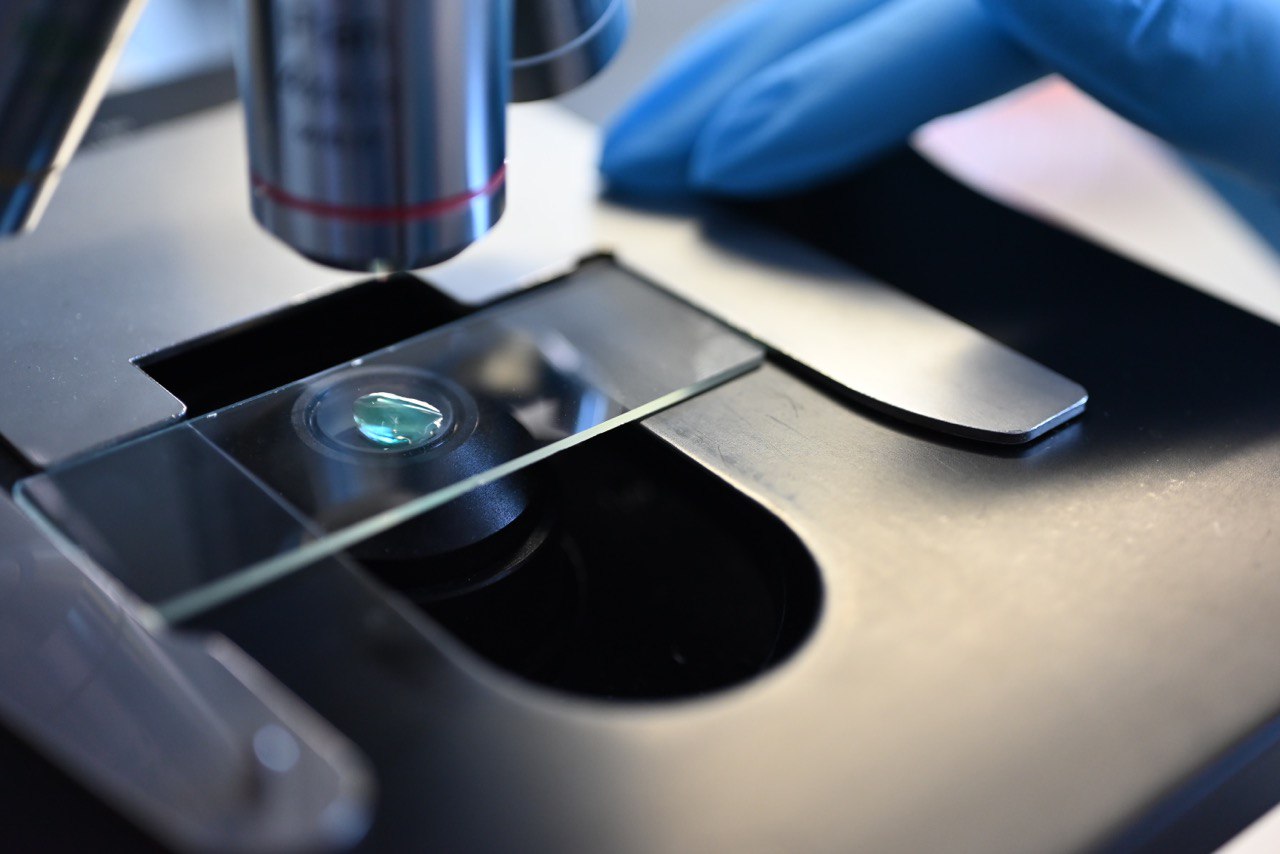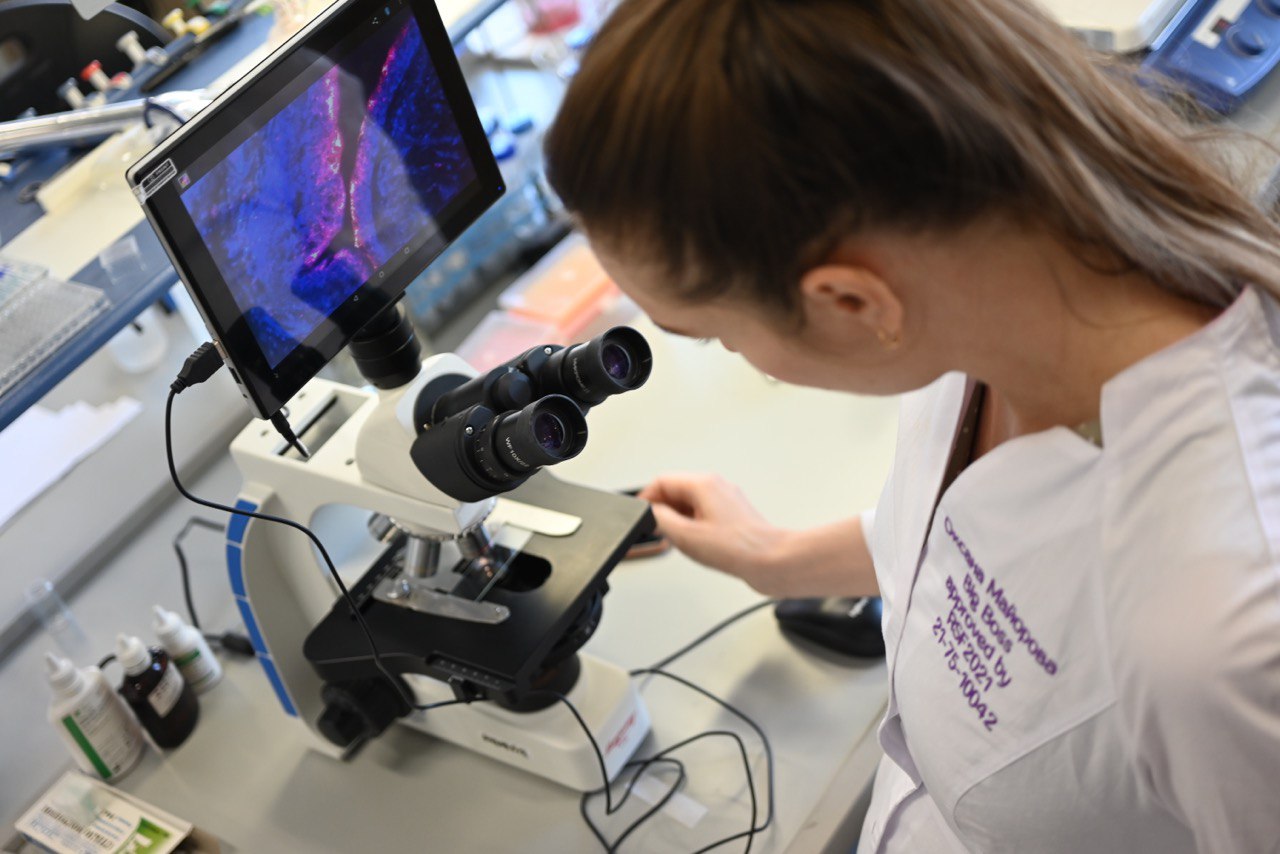Researchers have proposed using emulsion microgels for drug delivery to the bladder. This promises to make the treatment of urinary tract infections more effective and less painful. The microgels contain whey protein capable of attaching to the walls of the organ. As a result, the therapeutic effect of the administered medications at the site of inflammation lasts considerably longer. This makes the treatment of bladder infections faster and more comfortable, because fewer painful procedures introducing the medical agent into the organ are required. Supported by the Russian Science Foundation, the study was published in ACS Applied Materials & Interfaces.

Image. A drop of emulsion microgels stained with fluorescent dye. Credit: Oksana Mayorova/Saratov State University
In most cases, acute cystitis caused by E. coli is treated with antibacterial drugs in the form of pills. This, however, is not an effective way to address chronic bladder infections, because of the poor penetration of antibiotics into the inner wall of the affected organ. In other words, pills fail to produce a concentration of antibiotics in the bladder that is high enough to kill off the constantly multiplying bacteria causing the inflammation. Increasing the dosage runs the risk of an overdose, poisoning, and exposes the healthy organs to numerous side effects. Topical administration of antibacterial drugs directly into the bladder, through a catheter, makes it possible to administer a much higher dose of the medication without adverse effects on other organs and the body at large.
But due to the constant accumulation of urine in the bladder, medications introduced into its cavity are quickly washed out, potentially rendering the therapy ineffective. There is a way to solve this problem: drug delivery systems with so-called mucoadhesive properties, capable of attaching to the organ’s walls for prolonged periods of time.
A research team from Saratov State University and Skoltech’s Photonics and Neuro centers has developed a method for synthesizing emulsion microgels that can stick to the mucous membrane of the bladder and linger there.

Image. Observation of mucoadhesive microgels on the bladder walls. Credit: Oksana Mayorova/Saratov State University
The primary component of the team’s microgels is protein isolated from whey, a byproduct of cheese production used as a dietary supplement. The whey protein-based microgels are oil-in-water emulsions, with the protein molecules forming a shell around microdroplets of oil. The combination of an oil phase and a protein shell makes such carriers suitable for a wide range of water- and oil-soluble medications. The biological availability and relatively low cost of the ingredients makes it possible to produce versatile emulsive microgel-based targeted drug delivery systems.
The microgels form on the surface of oil droplets under the influence of temperature. The team showed in experiments on bladder tissue that such 3D hydrogel networks attach well to the mucous membrane. Moreover, experiments on mice by the Skoltech-Saratov team demonstrated a 10 times higher signal picked up from fluorescently stained microgels that were delivered into the bladder through a catheter, compared with intravenous injection. The microgel was also retained in the organ for a day. That means the proposed delivery method would reduce the number of repetitions of the painful procedure that are necessary, make the therapy faster, and improve the quality of life of patients with chronic bladder infections.
The principal investigator of this research project, supported by the Russian Science Foundation, is Senior Research Scientist Oksana Mayorova of Saratov State University, who commented: “Our approach could become the basis for new mucoadhesive drug delivery systems, improving the efficiency of the therapy for urinary tract diseases. Looking forward, we intend to investigate whether bladder cancer therapies are a possibility here and study how effective the therapy of acute chronic cystitis is if it uses microgels containing antibacterial drugs in combination with hyaluronic acid, which is necessary for restoring the mucous membrane of the bladder.”
Research Scientist Olga Sindeeva from Skoltech Neuro added: “Skoltech’s contribution to the study was visualizing the biodistribution of this new drug carrier. We used an in vivo fluorescence imaging device of the Institute’s BioImaging and Spectroscopy Core Facility to detect the microgel particles. Because they were stained with a fluorescent dye, we could trace them and reveal where they were present in the body of a living mouse and make sure they were largely localized in the bladder, in contrast with what happens after intravenous injection.”
Contact information:
Skoltech Communications
+7 (495) 280 14 81
